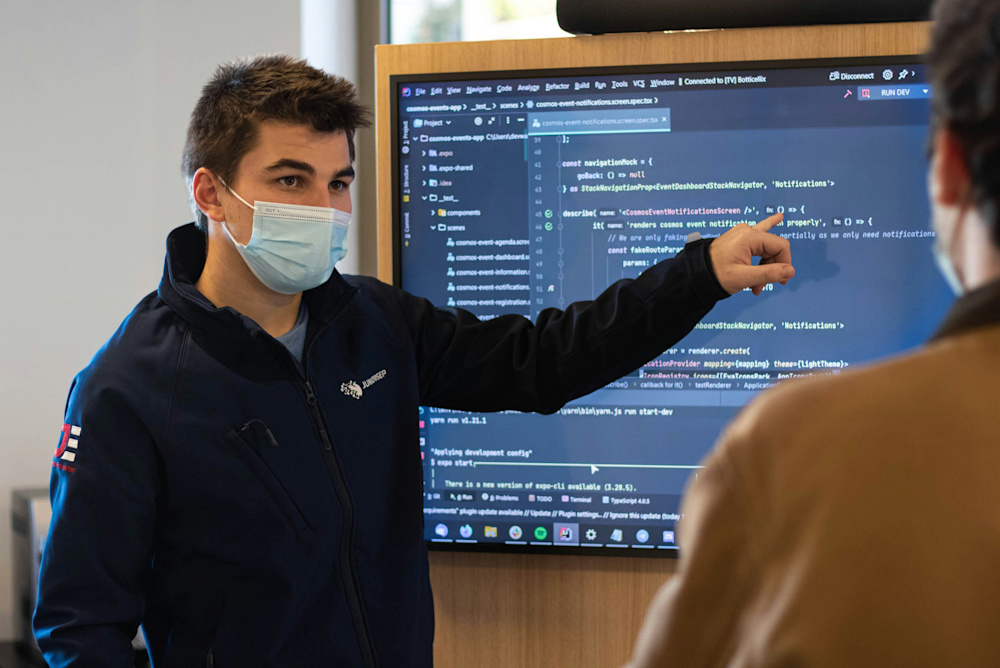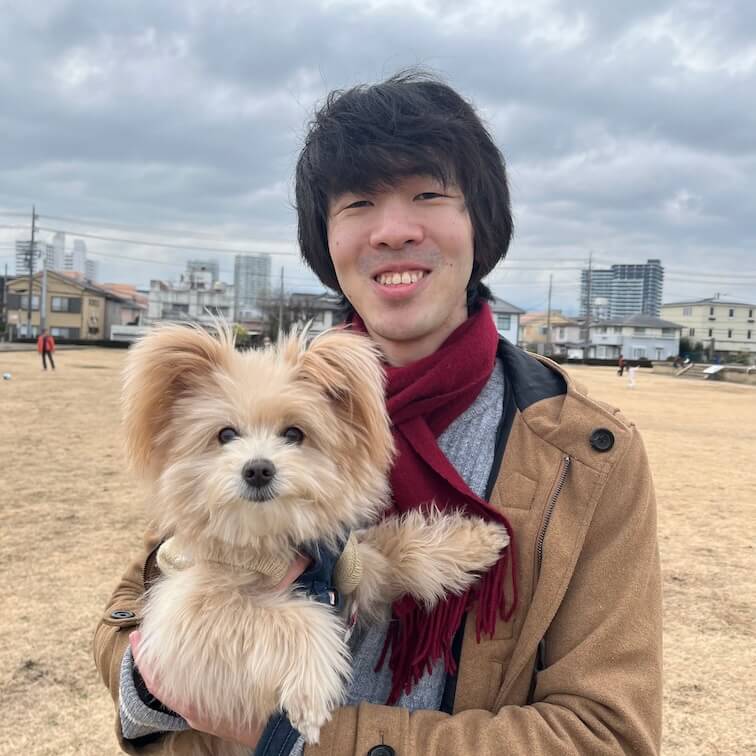Updated March 5, 2025
What It’s Like Joining a Coding Bootcamp in Japan
Thinking of joining a coding bootcamp in Japan?
If you've spent time learning how to code online, you've likely come across some of these bootcamps. Many make claims that sound too good to be true, like "Become a software engineer in 3 months!" and "Launch your new career and double your salary!"
Do bootcamps really deliver what they promise?
A few years ago, I was wondering the exact same thing. I was working a non-technical job and wanted to transition to software development, so I knew I would have to learn all of the necessary skills. My options were to self-study using online resources, or to attend actual classes with a proper curriculum.
In this article: 📝
Why I Chose to Join a Bootcamp
I first attempted to self-study but quickly got stuck. Ironically, the problem was that there were too many resources available, and an overwhelming number of decisions to make.
Should I learn Python or Javascript as my first language? Should I focus on frontend or backend development? Should I use freeCodeCamp, Codecademy, Udemy, or YouTube?
I would start learning a programming language, only to get distracted and change course after a few weeks. I jumped from one resource to another without committing to a single one. This went on for over a year, and didn't retain anything that I learned.
I realized that I needed structure and an actual curriculum to follow. I started looking for ways to learn in a classroom setting, which led to me discovering bootcamps.
Japan is home to several bootcamps for English speakers. The most notable ones are Code Chrysalis and Le Wagon, both of which are based in Tokyo. They offer prospective students the opportunity to learn to code and change their careers in a span of a few months.
If you're wondering which one is better, there's no right answer! They have different curriculums, durations, and tuition fees so it entirely depends on you.
Here is a comparison of the two:
Main language |
Ruby |
JavaScript |
Full-time or part-time? |
Both available |
Full-time |
Duration |
Full-time: 9 weeks Part-time: 24 weeks |
12 weeks |
Format |
Full-time: In-person Part-time: Hybrid |
In-person |
Tuition |
890,000 yen |
1,320,000 yen |
Average salary after graduation |
4,740,000 yen |
5,360,000 yen |
Code Chrysalis was an attractive choice with its slightly longer and more comprehensive curriculum. The higher post-graduation salary was also quite tempting.
However, I ended up choosing Le Wagon because it was more affordable, and because they offered the part-time program. Although I loved the idea of joining full-time and focusing 100% on learning code, I wasn't sure if I could take that much time off work while supporting myself. Doing the bootcamp part-time while working at my day job was the best option for me.
The Japan Dev team is a huge fan of both schools. If you’re passionate about working in education while contributing to Japan’s tech industry, we recommend checking out open positions at Code Chrysalis.
What Le Wagon Tokyo Was Like
Schedule
The part-time course required us to attend three class sessions per week.
Tuesday: 7pm to 10pm
Thursday: 7pm to 10pm
Saturday: 10am to 5pm
My batch was six months long, beginning in September and ending in March of the following year.
Sessions were held in Meguro, Tokyo, and students had the option to join either on-campus or remotely. I made an effort to attend in-person as much as possible, but having the option to go remote was extremely helpful. There were some days when work was busy and I just didn’t have time to make the commute. Two students in my batch lived quite far from the campus and joined fully-remote.
We also had homework on the days in between classes. It involved watching pre-recorded lectures and completing a set of flashcards to test our comprehension.
The class sessions and homework added up to over 16 hours of study time per week. As you can imagine, balancing that with a 40 hour work week was quite a challenge… but it was possible.
The Curriculum
We used Ruby as our main programming language.
Before starting the bootcamp, we were given prep work requiring us to learn the basics of Ruby ahead of time. Thanks to that, we were ready to jump in and start coding on day one.
We spent the first few weeks practicing the fundamentals, and worked on coding challenges to reinforce all of the concepts we learned.
The challenges started with simple tasks like “create a Black Jack game in the terminal,” which could be done with basic coding skills.
In just a few weeks we progressed to more complex and useful tasks, like "collect users' email addresses, validate them, and save them to a database."
We later covered topics like software architecture, databases, SQL, HTML, and CSS. After that, we learned how to put everything together with web frameworks and deploy our apps to a live environment.
Class Sessions
The main purpose of the sessions was not to simply sit in a classroom and listen to teachers lecture us about programming concepts. That would have been a waste of precious time.
Instead, we used that time to actually code. The purpose was to take everything we learned in the homework lectures and apply them in actual coding tasks.
One of the key aspects of the bootcamp was the fact that we always worked in teams. When doing coding exercises, we were assigned partners to work with. Students were responsible for communicating with their partners, keeping them accountable, and helping them if they got stuck.
If we had a problem that we couldn’t resolve by ourselves, we could request one-on-one help from the instructors or TAs. They would check our code and assist us, but without directly giving away the answers.
The coding exercises were designed to challenge us as much as possible, and they were hard. It felt like my brain was on fire constantly, being pushed to its limits for hours on end.
And I won’t hide the fact that it was sometimes unbelievably frustrating. Every engineer knows what it’s like being stuck on a problem and figuratively (sometimes literally) banging their head on the wall. As bootcamp students, we were spared no mercy and got to experience this feeling from day one.
But because the challenges were so hard, we also got to experience the blissful feeling of finally cracking the code and solving the problem. This is the exact same cycle that engineers deal with in their everyday work.
On Saturdays, we also had "live coding" sessions where one volunteer would stand in front of the room and code. They would share their thought process out loud and receive live feedback from the class. Although a bit intimidating for the volunteers, these sessions helped us improve our communication skills and get familiar with pair programming.

Projects
In the later weeks of the bootcamp, we split into teams of four and worked on projects together. We started with simple web apps and gradually worked our way up to more complex apps with modern features. This included user account creation, data storage, search, and the ability to create, edit, and delete content.
My classmates were incredibly creative and came up with great project ideas! One team built an app that used the Google Maps API to calculate the best locations for friends to meet up. Another team built an app that listened to audio from team meetings and automatically generated a list of follow-up tasks. My team built a productivity app to help users build good habits and visualize progress.
For each project, we were responsible for the entire ideation and development process. This involved the following steps:
Identify a problem to solve, and think about how we can solve it with an app
Design the app’s user interface from scratch using Figma
Decide what kind of data the app will handle, and design the database schema
Make a list of coding tasks, organize the list by priority, and assign tasks to each team member
Complete the tasks and push the code to GitHub
Review teammates’ code
Merge code and deploy to production
This is the exact same process that software engineers follow in their day-to-day work. Getting familiar with this workflow was just as important as learning the actual coding skills.
Working in teams also helped us improve our communication skills, which are vital in any software job. We got used to taking abstract ideas, translating them into words, and confirming that our teammates understood us.
Another huge benefit of team-based work was accountability. It’s tempting to slack off or procrastinate when working alone, but this isn’t an option when working with a team. After all, there’s nothing worse than being a slacker and letting down your teammates!
Demo Day
For our final project, we built a fully-functional web app following the process mentioned before. And the fun part was that we had to present it to a live audience on the final day of the camp: Demo Day.
This meant we had to actually share our screen, run our app, and showcase all of its features. No pre-recorded videos were allowed – everything was done live. If the app broke during the demo, there was nothing we could do.
People from all over the Tokyo area (including remote participants) were invited to attend. Tech workers, aspiring engineers, students, and entrepreneurs alike. Our Demo Day had well over 100 participants.
Talk about pressure! It was just as terrifying as it was exciting, and it was an amazing source of motivation. We all worked extremely hard to make sure we could build an app that we were proud to show to the world.
In the weeks leading up to Demo Day, there were certainly moments of panic. There were frantic nights spent putting together last-minute features and squashing unexpected bugs. But in the end, we completed the app and our presentation was a smashing success. My team and I felt an overwhelming sense of accomplishment that made all of the hard work and sleepless nights worth it.
The Community
Honestly, this was the best part of the bootcamp experience. I would argue that it was even more important than the education itself.
The instructors and teaching assistants were incredible. They were our coaches and friends just as much as they were our teachers. All of them were clearly passionate about tech and wanted to see us succeed in our new careers, so they pushed us to do our absolute best.
My cohort had 23 members coming from 10 different countries, and a variety of professional backgrounds. Some were English teachers looking to transition to tech careers. There were also recruiters, project managers, translators, blue-collar workers, students, and freelancers.
Some students, including myself, were already working for tech companies in non-technical roles. Others had no experience working in tech at all. And one classmate was actually the founder of a tech startup. He joined not to become an engineer, but to learn technical skills that would help him communicate with his engineering teams.
Some classmates were in their early 20s, some were in their 40s, and others were in between. Some had young children and were juggling work, family, and studies all at the same time. It was amazing working with such a diverse group, and really drove home the idea that it's never too late to change your career.
Despite our completely different backgrounds, we all had one thing in common: Everyone was extremely hard-working and motivated. This was a cohort of people serious about changing their careers, who paid for their own education and committed all of their free time to learning.
Being part of such a community was incredibly inspiring and encouraged me to give 100% of my effort. I made great friends and really enjoyed the camaraderie. We often went out for dinner and drinks after our Saturday sessions, and several of us took a trip together during the winter holidays.
Although the bootcamp was insanely challenging, I also made great memories and I still look back fondly on those days.

The Job Hunting Process
This is the big question. How do we actually find jobs after finishing the bootcamp?
Finding a job as an entry level developer is tough. Thankfully, Le Wagon provided lots of support following the bootcamp. They ran a Career Week which featured daily workshops to help us write strong resumes, find jobs to apply for, and nail the interviews.
Le Wagon and Code Chrysalis both have strong partnerships with actively-hiring tech companies in Japan. They share job listings with their alumni, specifically mentioning the ones that are good fits for recent graduates.
Le Wagon also coordinated several events where guest speakers from major tech companies came to speak with us directly. Some were hiring managers who talked about what kind of people they want to work with and how applicants can boost their chances of getting hired.
A recruiter from Mercari did a "resume roasting" session where he reviewed the resumes of recent graduates and gave his feedback, no punches pulled.
Le Wagon’s data shows that the majority of graduates find a job within 3 months, and I found this to be true. More than half of my batchmates landed tech jobs within months after graduating. The majority of them were able to find companies friendly to English speakers and did not need to speak business-level Japanese.
What I Did After Finishing the Bootcamp
I was one of the lucky people who was already working for a tech company, but in a non-technical role. With my new coding skills and confidence in my ability to keep learning, I requested an internal transfer to the engineering division.
To my delight, they gave me the chance! But there was a big catch:
I would have to go through the entire interview process from start to finish. The exact same process that external applicants go through. Understandably, they weren't going to just let me into the engineering division for free.
Becoming an engineer in my company involved:
A LeetCode style technical interview
3 more interviews with members and managers of an engineering team with an opening
A take-home assignment to be written with Go, a language I had no experience with
What a process! It took about 3 months, along with some blood, sweat, and tears.
Passing the interviews required skills that I didn't learn at Le Wagon. With only 24 weeks, we obviously had no time to cover algorithms and other languages like Go. I was completely on my own.
And I succeeded, thanks to the fundamental skills that Le Wagon taught me. The most important ability I picked up was the ability to think like a software engineer and learn new concepts quickly. This is the skill that will remain important for the rest of my career, because technology constantly changes. There will always be new languages, frameworks, and tools to learn, and it’s the engineer’s duty to keep up.
Finishing the camp and getting my first software job was a whirlwind, but things eventually calmed down. After getting settled with my new job, I moved to Kyoto to work remotely.

The Caveats
I’ve mentioned all of the things I loved about my experience. But of course, a bootcamp is not a silver bullet that will magically solve all of your problems. If you’re thinking of joining one, there are several important points to keep in mind.
The first is that bootcamps do not guarantee success in finding a tech job. Finishing the coursework is only a small part of the journey, and you will have to continue working just as hard after it’s done.
It’s often said that looking for a full-time job is a full-time job, and I believe this isn’t an exaggeration. It’s a process that requires you to polish your resume, send tons of applications, prepare for interviews, and study for coding assessments. It takes months and can be quite an emotional roller coaster.
Another thing to note is that a certificate from Le Wagon or Code Chrysalis is by no means the equivalent of a computer science degree. Bootcamps skip the fundamentals of CS, and this is inevitable considering how short and condensed they are. If you want a full-blown program covering software from every angle, a bootcamp will be a mismatch.
And finally, completing a bootcamp is simply really hard.
Coding for three consecutive hours after a full day of work is exhausting. Coding for seven hours on Saturdays is exhausting. Not everyone makes it to the end – two students in my batch were unable to keep up with the course and unfortunately had to drop out.
It was a huge commitment, and simply signing up and going to class was not enough. I sacrificed a great deal of my free time, and perhaps a bit of my sanity as well.
If you understand these points and you’re willing to put in the hard work, then a bootcamp might be right for you.
Was It The Right Choice?
For me, absolutely.
As challenging as it was, learning to code with Le Wagon was an overwhelmingly positive experience. It pushed me to my limits and helped me accomplish things that I couldn’t have done on my own.
Can you learn to code without a bootcamp? Of course – tons of people out there learn the necessary skills and transition to tech careers purely through self-study. It’s a path that works for many, but it wasn’t for me.
Joining a bootcamp accelerates the learning process, makes it enjoyable, and provides accountability. So whether it’s Le Wagon, Code Chrysalis, or another bootcamp in Japan, I have no doubt that they can all help you launch a new career in tech. Just remember to work hard, smile, and enjoy the journey!
Get Job Alerts
Sign up for our newsletter to get hand-picked tech jobs in Japan – straight to your inbox.








